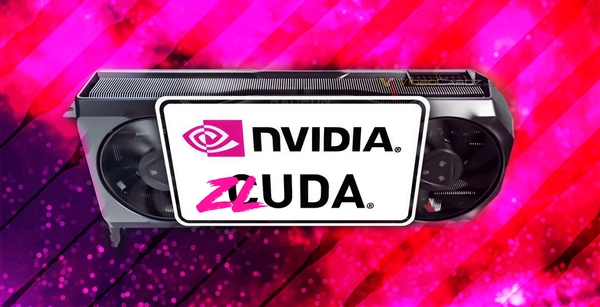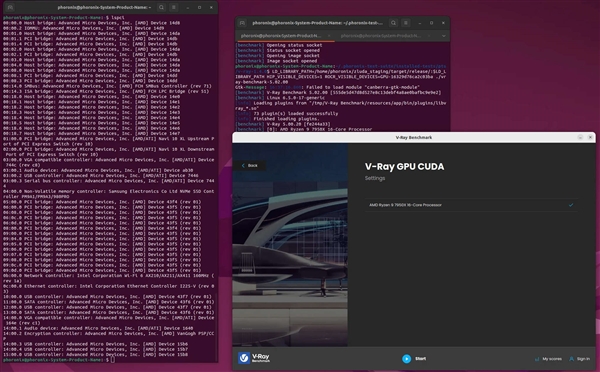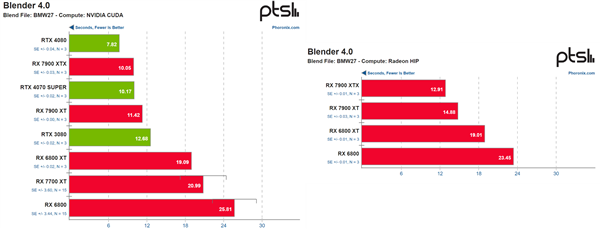 Technology peripherals
Technology peripherals
 It Industry
It Industry
 Developer Andrzej Janik creates ZLUDA: allowing non-NVIDIA hardware to play CUDA applications
Developer Andrzej Janik creates ZLUDA: allowing non-NVIDIA hardware to play CUDA applications
Developer Andrzej Janik creates ZLUDA: allowing non-NVIDIA hardware to play CUDA applications
News on February 16th. Although NVIDIA’s CUDA has built solid ecological barriers after years of development, making it difficult for other competitors to break through, developer Andrzej Janik used Intel’s oneAPI to independently develop a new product called "ZLUDA" CUDA compatible solution. The emergence of this solution enabled Intel hardware to run CUDA applications natively. However, the project was later suspended for unknown reasons. The emergence of this project has attracted the attention of the industry because it provides Intel with an opportunity to break through NVIDIA's barriers. However, the reasons for project suspension may be related to technical implementation or commercial considerations. Although it is not yet clear, this suspension may have a certain impact on Intel's development in the GPU field. In any case, the emergence of this project proves that competition in the market still exists, and technological innovation and developer efforts will still promote the development of the industry.

However, ZLUDA’s story does not end here. After receiving support from AMD, the project was restarted and achieved greater breakthroughs. With the introduction of the ZLUDA library, AMD graphics cards can directly run CUDA applications without any code adjustment or migration work. While this does not guarantee that all CUDA applications will run perfectly, it is certainly a significant advance. This innovation is a huge boon for users of AMD graphics cards, who can more easily enjoy the advantages of CUDA applications. In addition, this also gives AMD a favorable position in the competition with NVIDIA, allowing more users to choose AMD products. In general, the birth of ZLUDA brings more choices and convenience to users, and brings more competitive advantages to AMD.
According to the editor’s understanding, unfortunately, AMD also chose to suspend it after supporting this project for two years, casting a shadow on ZLUDA’s prospects. Although it is unclear whether there was pressure from NVIDIA.

Fortunately, the ZLUDA project has not been completely stopped. The project has been made free and open source, so any interested developer can use it and continue research. Additionally, ZLUDA has been confirmed to run CUDA applications seamlessly on AMD’s ROCm platform. For example, developers can use CUDA as the rendering API for Blender 4.0 or V-Ray. Especially for Blender, which natively features the Radeon HIP computational renderer, and now with ZLUDA support, rendering speeds are expected to be even faster. This provides developers with more options to help them perform GPU computing and rendering tasks more efficiently.

In addition, Andrzej Janik is still studying ZLUDA in depth and is committed to enabling AMD graphics cards to run NVIDIA's DLSS technology. Internal tests show that compared to the OpenCL solution, ZLUDA performs better in most cases, sometimes even exceeding 75% performance improvement. However, since the project is still in the development stage, there may be times when it is less efficient. Nonetheless, the emergence of ZLUDA has brought new possibilities and challenges to the CUDA ecosystem.
The above is the detailed content of Developer Andrzej Janik creates ZLUDA: allowing non-NVIDIA hardware to play CUDA applications. For more information, please follow other related articles on the PHP Chinese website!

Hot AI Tools

Undresser.AI Undress
AI-powered app for creating realistic nude photos

AI Clothes Remover
Online AI tool for removing clothes from photos.

Undress AI Tool
Undress images for free

Clothoff.io
AI clothes remover

Video Face Swap
Swap faces in any video effortlessly with our completely free AI face swap tool!

Hot Article

Hot Tools

Notepad++7.3.1
Easy-to-use and free code editor

SublimeText3 Chinese version
Chinese version, very easy to use

Zend Studio 13.0.1
Powerful PHP integrated development environment

Dreamweaver CS6
Visual web development tools

SublimeText3 Mac version
God-level code editing software (SublimeText3)

Hot Topics
 1386
1386
 52
52
 ASUS unveils Adol Book 14 Air with AMD Ryzen 9 8945H and curious incense dispenser
Aug 01, 2024 am 11:12 AM
ASUS unveils Adol Book 14 Air with AMD Ryzen 9 8945H and curious incense dispenser
Aug 01, 2024 am 11:12 AM
ASUS already offers various 14-inch laptops, including the Zenbook 14 OLED (curr. $1,079.99 on Amazon). Now, it has decided to introduce the Adol Book 14 Air, which looks like a typical 14-inch laptop on the face of it. However, an inconspicuous meta
 AMD Radeon RX 7800M in OneXGPU 2 outperforms Nvidia RTX 4070 Laptop GPU
Sep 09, 2024 am 06:35 AM
AMD Radeon RX 7800M in OneXGPU 2 outperforms Nvidia RTX 4070 Laptop GPU
Sep 09, 2024 am 06:35 AM
OneXGPU 2 is the first eGPUto feature the Radeon RX 7800M, a GPU that even AMD hasn't announced yet. As revealed by One-Netbook, the manufacturer of the external graphics card solution, the new AMD GPU is based on RDNA 3 architecture and has the Navi
 Ryzen AI software gets support for new Strix Halo and Kraken Point AMD Ryzen processors
Aug 01, 2024 am 06:39 AM
Ryzen AI software gets support for new Strix Halo and Kraken Point AMD Ryzen processors
Aug 01, 2024 am 06:39 AM
AMD Strix Point laptopshave just hit the market, and the next-gen Strix Halo processors are expected to be released sometime next year. However, the company has already added support for the Strix Halo and Krackan Point APUs to its Ryzen AI software.
 AMD Z2 Extreme chip for handheld consoles tipped for an early 2025 launch
Sep 07, 2024 am 06:38 AM
AMD Z2 Extreme chip for handheld consoles tipped for an early 2025 launch
Sep 07, 2024 am 06:38 AM
Even though AMD tailor-made the Ryzen Z1 Extreme (and its non-Extreme variant) for handheld consoles, the chip only ever found itself in two mainstream handhelds, the Asus ROG Ally (curr. $569 on Amazon) and Lenovo Legion Go (three if you count the R
 First Minisforum mini PC with Ryzen AI 9 HX 370 rumored to launch with high price tag
Sep 29, 2024 am 06:05 AM
First Minisforum mini PC with Ryzen AI 9 HX 370 rumored to launch with high price tag
Sep 29, 2024 am 06:05 AM
Aoostar was among the first to announce a Strix Point mini PC, and later, Beelink launched the SER9with a soaring starting price tag of $999. Minisforum joined the party by teasingthe EliteMini AI370, and as the name suggests, it will be the company'
 AMD announces 'Sinkclose' high-severity vulnerability, affecting millions of Ryzen and EPYC processors
Aug 10, 2024 pm 10:31 PM
AMD announces 'Sinkclose' high-severity vulnerability, affecting millions of Ryzen and EPYC processors
Aug 10, 2024 pm 10:31 PM
According to news from this site on August 10, AMD officially confirmed that some EPYC and Ryzen processors have a new vulnerability called "Sinkclose" with the code "CVE-2023-31315", which may involve millions of AMD users around the world. So, what is Sinkclose? According to a report by WIRED, the vulnerability allows intruders to run malicious code in "System Management Mode (SMM)." Allegedly, intruders can use a type of malware called a bootkit to take control of the other party's system, and this malware cannot be detected by anti-virus software. Note from this site: System Management Mode (SMM) is a special CPU working mode designed to achieve advanced power management and operating system independent functions.
 Beelink SER9: Compact AMD Zen 5 mini-PC announced with Radeon 890M iGPU but limited eGPU options
Sep 12, 2024 pm 12:16 PM
Beelink SER9: Compact AMD Zen 5 mini-PC announced with Radeon 890M iGPU but limited eGPU options
Sep 12, 2024 pm 12:16 PM
Beelink continues to introduce new mini-PCs and accompanying accessories at a rate of knots. To recap, little over a month has passed since it released the EQi12, EQR6 and the EX eGPU dock. Now, the company has turned its attention to AMD's new Strix
 Deal | Lenovo ThinkPad P14s Gen 5 with 120Hz OLED, 64GB RAM and AMD Ryzen 7 Pro is 60% off right now
Sep 07, 2024 am 06:31 AM
Deal | Lenovo ThinkPad P14s Gen 5 with 120Hz OLED, 64GB RAM and AMD Ryzen 7 Pro is 60% off right now
Sep 07, 2024 am 06:31 AM
Many students are going back to school these days, and some may notice that their old laptop isn't up to the task anymore. Some college students might even be in the market for a high-end business notebook with a gorgeous OLED screen, in which case t



